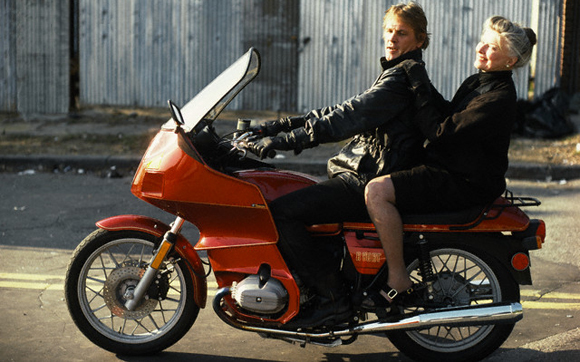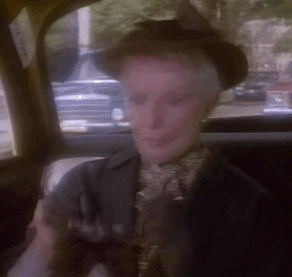Episode 46 of 52: In which Katharine Hepburn makes a comedy about suicide with Nick Nolte because she's a living legend and she can do whatever she wants.
 The truth about a career that spans seven decades, is that for the majority of that career, you'll be what’s traditionally thought of as “old.” Hollywood does not like “old.” The magnificent part of watching Katharine Hepburn age has been watching her flip old age (and Hollywood) the bird. True, her head wobbles, her hair is gray, and her voice is reedy. Still, she leaps after hot air balloons, bicycles, hauls wood, and even wins Academy Awards at an age far past what would traditionally be considered “her prime.” For the past few years, Kate has looked old, sounded old, and even talked about being old, but the stubbornly energetic woman has never felt old. Which is why Grace Quigley is more than a little scary.
The truth about a career that spans seven decades, is that for the majority of that career, you'll be what’s traditionally thought of as “old.” Hollywood does not like “old.” The magnificent part of watching Katharine Hepburn age has been watching her flip old age (and Hollywood) the bird. True, her head wobbles, her hair is gray, and her voice is reedy. Still, she leaps after hot air balloons, bicycles, hauls wood, and even wins Academy Awards at an age far past what would traditionally be considered “her prime.” For the past few years, Kate has looked old, sounded old, and even talked about being old, but the stubbornly energetic woman has never felt old. Which is why Grace Quigley is more than a little scary.
Grace Quigley (originally titled The Ultimate Solution of Grace Quigley) is meant to be a black comedy about assisted suicide. Think Arsenic and Old Lace by way of Harold and Maude. Nick Nolte stars as a neurotic hitman with the misfortune of meeting Mrs. Quigley (our own Kate), an octogenarian who blackmails him into starting a business with her: killing people who want to be killed. Homicidal hilarity ensues, or would, except it isn't very funny. Despite a striptease set to Tchaikovsky, a hearse chase, and several attempts at witty banter, the movie vacillates between morbidity and dullness. The problem is threefold: 1) director Anthony Harvey (who’d beautifully directed Kate in The Lion in Winter and The Glass Menagerie) lacks the light touch needed for black comedy. 2) Nick Nolte’s character is about as good at killing people as he is at delivering one-liners (which is to say not good at all). Most importantly, 3) For the first time onscreen, Katharine Hepburn looks so frail that it is uncomfortably easy to believe she wants to die.

Kate's brush with death and life affirmations after the jump.
During the filming of Grace Quigley, Kate crashed her car into a tree. She fractured her ankle, and was effectively hobbled for a few months. Even when Kate got back on her feet, she never fully recovered. The short term result was that the Kate’s customary charisma is lacking. She seems so tired and sad. Several times while watching Grace Quigley, I re-checked IMDb to verify that this movie was really only made 2 years after On Golden Pond. Kate looks as though she's aged a decade, not a few years. As Mrs. Quigley, Kate performs with an undercurrent of fragility, not because of great, risk-taking acting, but because she’s actually fragile.
Without Kate’s natural ebullience, Grace Quigley is DOA. There is a colorful cast of side characters, but unfortunately thanks to the nature of the story, they keep getting bumped off. Attempting to make a comedy about assisted suicide in 1983 was gutsy - it’s no less controversial a topic now than it was 30 years ago. To get an audience to accept the premise of the film, they must root for the people who want to commit suicide, but not mourn the characters. Unfortunately, the film tips towards sadness too often when characters describe their reasons to die - loneliness and money are prevailing reasons. This is the final nail in the coffin for the film’s comedic elements.
Grace Quigley was the first sign that, at age 74, Katharine Hepburn was allowing herself to slow down. She would remain busy in the 1980s, and begin working on her soon-to-be-smash-hit autobiography. However, the films Kate made were fewer, shorter, and smaller. Nonetheless, Katharine Hepburn regained some of her zeal. As the septuagenarian said,
“I never lose sight of the fact that just being is fun.”

 Previous Week: On Golden Pond (1981) - In which Katharine Hepburn makes Oscars history by asserting that old people are interesting.
Previous Week: On Golden Pond (1981) - In which Katharine Hepburn makes Oscars history by asserting that old people are interesting.
Next Week: Mrs. Delafield Wants To Marry (1986) - In which Katharine Hepburn stars in a geriatric version of The Way We Were.